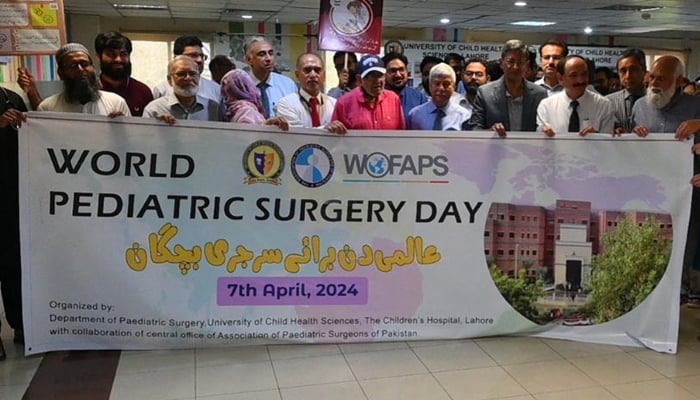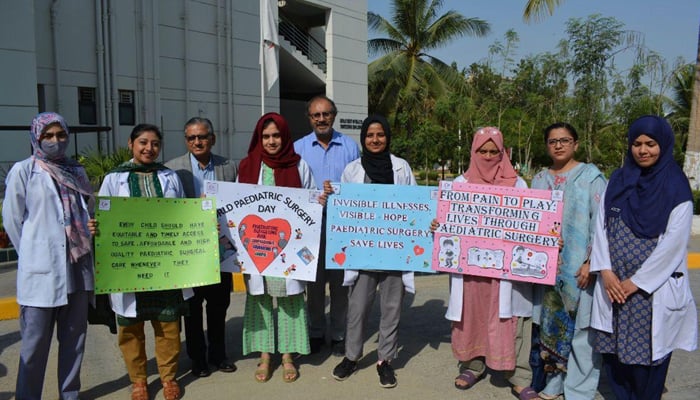'Nearly 7,000 children die daily in Pakistan amid paediatric surgeons' shortage'
Dr Arshad says out of total deaths, 150 children lose thier life to congenital anomalies each day
April 07, 2024

Nearly 7,000 infants and children die in Pakistan each day, of which 150 children lose their life to congenital anomalies, on average primarily due to severe shortage of paediatric surgeons, according to health experts.
Prof Dr Muhammad Arshad, president of the Association of Paediatric Surgeons of Pakistan (APSP), said around 2.5 million newborn children die annually and a large number of these children can be saved by increasing the number of paediatric surgeons and posting them at district headquarter (DHQ) hospitals across Pakistan.”
Pakistan needs at least 1,250 paediatric surgeons, yet only around 160-170 are currently practicing.
According to Dr Arshad, around 33% of Pakistan’s population is comprised of children less than 15 years of age, but only 0.2 paediatric surgeons are available for 100,000 people in Pakistan, while in the United States, where hardly 16% of the population is of 15 years of age, the ratio is 2.6 paediatric surgeons for 100,000 people.
“Congenital anomalies are the 5th leading cause of deaths in Pakistan, while thousands of more children die due to trauma and other health conditions including cancer, kidney stones, and others. If we have the required number of pediatric surgeons serving at public health facilities on the district level, most of these precious lives can be saved,” Dr Arshad, who is serving as the academic head of paediatric surgery at Liaquat National Hospital Karachi, observed.
Talking to Geo News in connection with World Paediatric Surgery Day 2024 observed on April 7 (today), he said that although specialised children’s hospitals are now being established in major cities, including Lahore and Karachi, he deplored that they are extremely overburdened. Children who require elective surgeries often have to wait for five to six months for their turn, resulting in serious, life-threatening complications.

“Often when children requiring surgeries are brought to the specialized medical centers, due to the delay in diagnosis, they already have developed complications, including sepsis, which makes their treatment extremely difficult and many of them die even after surgeries and treatment,” he maintained.
Prof Arshad said paediatric surgeons play a crucial role in providing specialised care to infants, children, and adolescents, particularly in diagnosing and treating surgical conditions unique to this population. However, the shortage of these skilled professionals has strained the healthcare infrastructure and hindered access to timely and quality surgical care for children in need.
“The shortage of paediatric surgeons in Pakistan is multifaceted, stemming from various challenges within the healthcare system. One primary issue is the limited number of training programs and educational opportunities available for aspiring paediatric surgeons. Despite the growing demand for paediatric surgical services, there are only a handful of institutions in Pakistan offering formal training in paediatric surgery. This scarcity of training programs has contributed to a dearth of qualified paediatric surgeons entering the workforce,” he said.
Due to the lack of opportunities and jobs in the public sector, every year dozens of trained and qualified pediatric surgeons leave Pakistan for Europe, America, and the Middle East, where they are welcomed with open arms, he said, but claimed that paediatric surgeons would love to serve if they are provided opportunities and incentives in their own country.
He pointed out that the existing pediatric surgery workforce in Pakistan faces significant workload pressures and resource constraints. Many pediatric surgeons are overburdened with high caseloads, leading to burnout and fatigue. Additionally, inadequate access to essential surgical equipment, facilities, and support staff further exacerbates the challenges faced by pediatric surgeons in delivering optimal care to their patients.
“The shortage of pediatric surgeons has profound implications for the health outcomes of children in Pakistan. Delayed or inadequate surgical interventions can result in complications, long-term disabilities, and even loss of life for pediatric patients,” he said, adding that the lack of access to specialized pediatric surgical care disproportionately affects vulnerable populations, including children from low-income families and rural communities, who may face barriers in accessing healthcare services.
“There is a need to increase medical students’ exposure to paediatric surgery and strengthen paediatric surgery training programmes across the country. This includes increasing the number of residency positions, enhancing the quality of training, and providing opportunities for continuing medical education and professional development for practicing pediatric surgeons. Additionally, investment in healthcare infrastructure and resources is essential to support pediatric surgical services,” he suggested.
Other experts believe initiatives to incentivise medical students to pursue careers in paediatric surgery, such as scholarships, grants, and loan forgiveness programmes, can help attract and retain talented individuals in this specialty. Promoting interdisciplinary collaboration and telemedicine initiatives can help extend the reach of paediatric surgical services to underserved areas and improve access to care for children in remote regions.











